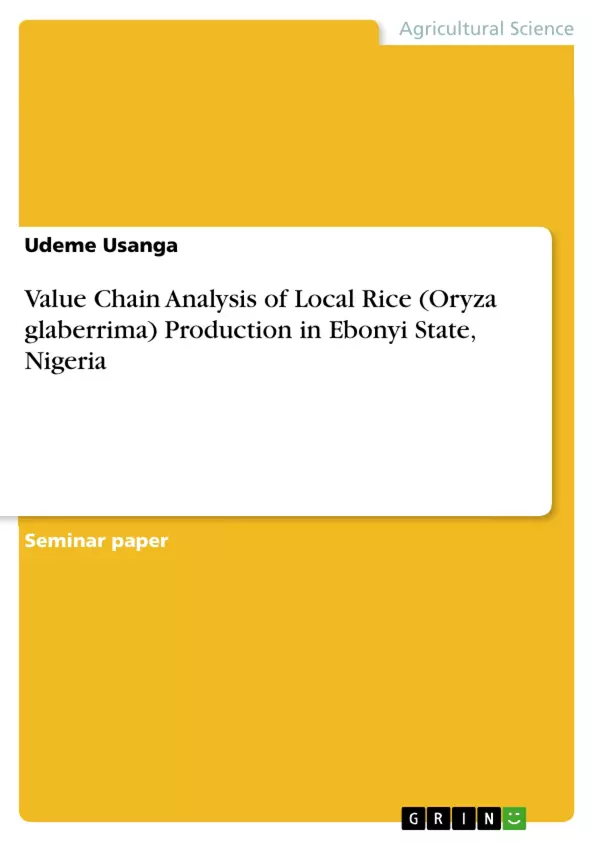This study examined local rice production and value addition in Ebonyi State, Nigeria. Data were purposely collected from Ishiagu and Abakiliki from 144 rice value chain actors. It was found that wholesalers enjoy the largest share of the marketing margin, where at cross boundary markets, the wholesalers’ profit goes as higher as N76.0/kg as compared to N39.5/kg, received by local farmers, showing unequal distribution of benefits among the local rice value chain actors, where reward to traders is extremely higher than that of producers. The profitability analysis shows a net return of N4, 085 with a BCR of 1.14:1, meaning that local rice production is viable and profitable in the area.
Two separate multiple regression analysis, using the double-log regression as the lead equation for the producers (farmers) gave R2 of 0.923 and F-Ratio of 51.031, being an indication that 92.3% of the variation in the rice output was explained by the explanatory variables, while 7.70% was accounted-for due to error term (ei) and uncaptured variables. For the secondary value chain actors (transporters, millers, wholesalers and retailers), the exponential function gave R2 of 0.782 and F-Ratio of 38.104, being an indication that 78.2% of the variation in the rice output was explained by the explanatory variables (socio-economic characteristics) while 21.8% was accounted-for due to stochastic error term (ei) and uncaptured variables. The study recommended improvement of effectiveness in cooperative membership to attract finance for rice production, inputs and value addition, purchase of machines for processing and packaging, transportation and marketing. Furthermore, lack of adequate agricultural infrastructure and market information systems was observed to be critical areas of policy concerns. Policies for microcredit institutions on provision of credits to local rice farmers are also recommended to improve rice productivity by capacitating smallholder farmers to use modern agricultural machinery.
Inhaltsverzeichnis (Table of Contents)
- Introduction
- Purpose of the Study
- Methodology
- Results and Discussion
- Conclusion and Recommendations
- References
Zielsetzung und Themenschwerpunkte (Objectives and Key Themes)
This study delves into the economic analysis of the local rice production value chain in Ebonyi State, Nigeria. The primary aim is to understand the socio-economic characteristics of stakeholders, describe the local rice value chain, and determine the factors influencing production and the effects of socio-economic characteristics on production. The study also explores the cost-benefit analysis of packaging locally milled rice and identifies constraints within the value chain.
- Socio-economic characteristics of rice value chain actors
- Description of the local rice value chain
- Factors affecting local rice production
- Influence of socio-economic characteristics on production
- Constraints of local rice production
Zusammenfassung der Kapitel (Chapter Summaries)
- Introduction: This chapter provides an overview of rice production in Nigeria, highlighting its significance as a staple food and its role in food security. It discusses the challenges faced by local rice production, including competition from imported rice, the decline of formal extension systems, and the dominance of smallholder farmers. The chapter emphasizes the importance of understanding the local rice value chain to promote and support rice sufficiency in the country.
- Purpose of the Study: This chapter outlines the main purpose and specific objectives of the study. The study aims to analyze the local rice production value chain economically, focusing on identifying stakeholders, describing the value chain, and determining factors affecting production and profitability.
- Methodology: This chapter details the research methodology employed in the study. It explains the study area, the sampling technique used to select smallholder rice farmers, and the data collection methods, including interviews, questionnaires, and a multi-stage sampling approach. The chapter highlights the focus on gathering data related to production, processing, sales, market access, and socio-economic information.
Schlüsselwörter (Keywords)
The study focuses on the local rice production value chain in Ebonyi State, Nigeria, emphasizing the socio-economic characteristics of stakeholders, the factors influencing production, and the cost-benefit analysis of packaging locally milled rice. It aims to identify key constraints within the value chain and provide recommendations for improvement. Key terms include local rice production, value chain analysis, socio-economic characteristics, production factors, cost-benefit analysis, packaging, and constraints.
Frequently Asked Questions
What is the main focus of the Ebonyi State rice study?
The study analyzes the value chain of local rice production (Oryza glaberrima) in Nigeria, focusing on profitability, stakeholder roles, and socio-economic factors.
Who benefits most from the rice marketing margin?
Wholesalers enjoy the largest share of the profit, receiving significantly more (up to N76.0/kg) compared to local farmers (N39.5/kg).
Is local rice production in Ebonyi State profitable?
Yes, the analysis shows it is viable and profitable, with a Benefit-Cost Ratio (BCR) of 1.14:1.
What are the main constraints identified in the value chain?
Key constraints include lack of agricultural infrastructure, poor market information systems, and limited access to modern machinery and credit.
What policy recommendations does the study suggest?
The study recommends improving cooperative effectiveness, providing microcredit to smallholders, and investing in processing and packaging technology.
- Citation du texte
- Udeme Usanga (Auteur), 2019, Value Chain Analysis of Local Rice (Oryza glaberrima) Production in Ebonyi State, Nigeria, Munich, GRIN Verlag, https://www.grin.com/document/1382698



